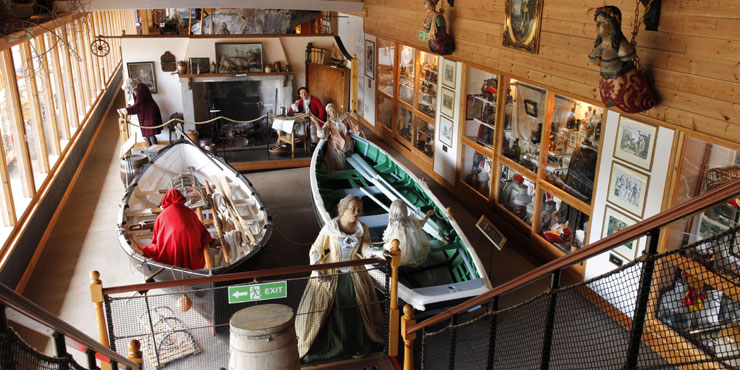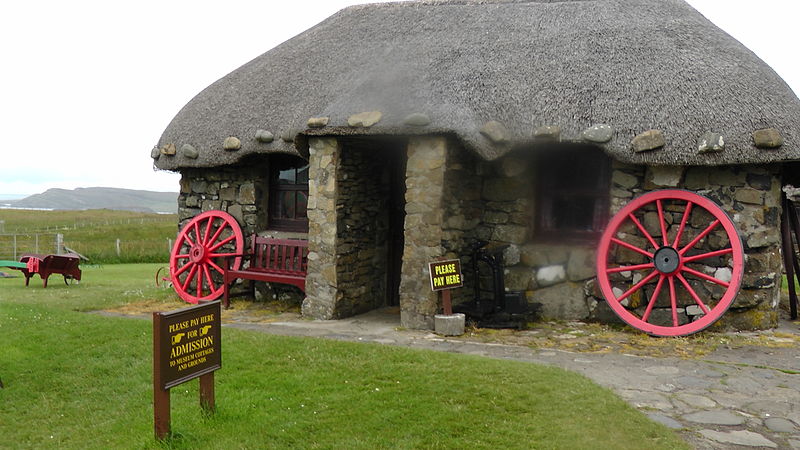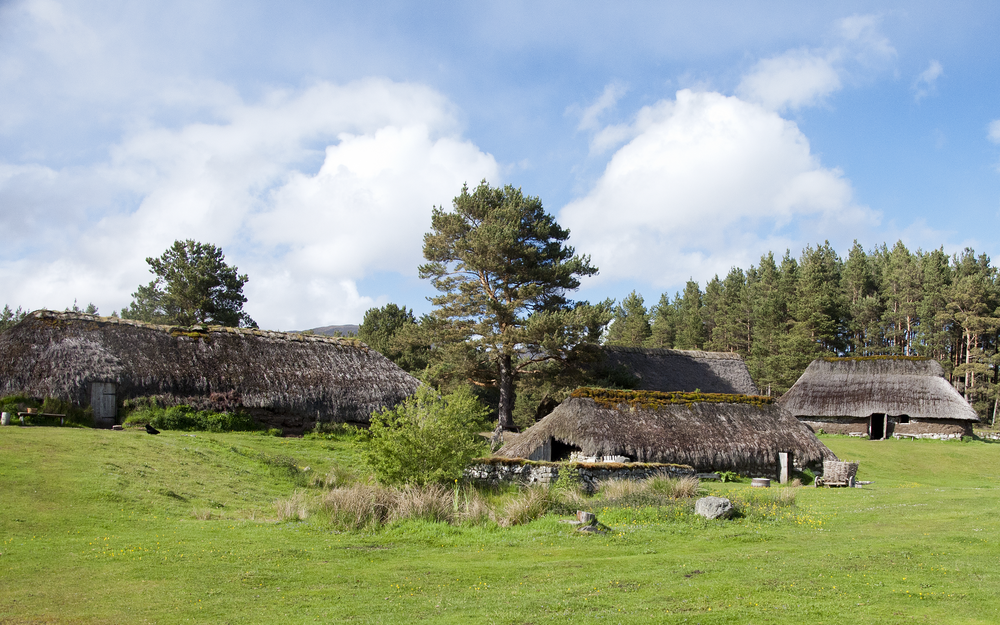Go offline with the Player FM app!
UTTS #024 Ancestral Tourism: Tips for Archival Research in Scotland
Archived series ("Inactive feed" status)
When?
This feed was archived on August 01, 2022 12:32 (
Why? Inactive feed status. Our servers were unable to retrieve a valid podcast feed for a sustained period.
What now? You might be able to find a more up-to-date version using the search function. This series will no longer be checked for updates. If you believe this to be in error, please check if the publisher's feed link below is valid and contact support to request the feed be restored or if you have any other concerns about this.
Manage episode 187669173 series 1547954

Are you like that guy on TV; have you changed your lederhosen for a kilt? According to "USA Today" genealogy is the 2nd most popular hobby in the USA. Genealogy websites are the 2nd most frequently visited online. Why this sudden popularity? Officials point to reality genealogy TV shows (like "Who Do You Think You Are?") and thenew direct-to-consumer DNA testing kits. The number one hobby? Gardening. The number one websites, the "adults only" type.
No matter the why's of its popularity genealogy research is leaving its mark on the tourism industry in a genre called "ancestral" tourism. In direct terms that's people who visit a foreign land in search for more information about their ancestors, their family roots. Online websites and databases can yield a lot of raw data about birth and death records, marriages, and more, but even computers a limited. A database can't let you see and feel what it was like to live in a "tigh dubh" (tie-doo) or "black house" on Scotland's Outer Hebrides in the 1700s. That's where research meets tourism. To learn all you can about your ancestor's lifestyle you need to visit where they lived, and if your ancestral heritage is Scottish, that means a trip to Scotland.
However, just going to Scotland isn't the answer. Millions of people visit Scotland annually. They go to tour Edinburgh Castle, to see the Highlands, to search for Nessie, and perhaps take in a whisky tasting or two along the way. Going to Scotland is only part of the equation, the other part is research.
Theresa Mackay is a second generation Scottish-Canadian, currently completing her Master of Letters in Scottish history through the University of the Highlands and Islands in Scotland. She is a self-confessed affinity Scot – having not been born in Scotland but exhibiting a strong connection to the land. Born in Montreal, but now living in Victoria, British Columbia, sheis owner of the Larchgrove Marketing Group – a consulting company that works with people and projects with Scotland in their soul --- and she is on the board of the Victoria Highland Games Association and keenly involved in plans to build a Scottish Cultural Center in Victoria.

Theresa Mackay doing some ancestral tourism of her own in Scotland. Photo copyright and courtesy Theresa MacKay.
To hear Mackay tell it there are three keys to successful ancestral tourism and archival research:
•Books
•Archives
•Feet on the ground (Museums, pubs, ceilidhs, Highland Games, etc)
The first key to gaining a better understanding of who your ancestors were and what their life was like is to gain a better understanding of the true culture they were a part of. "Braveheart", "Rob Roy" and other Hollywood films are good entertainment but can be far from historical fact. For MacKay, "reading is fundamental" if you want to know real Scottish history and not the many popularized myths. MacKay stresses this is not academic reading but enjoyable reading and suggests works by T.M. Devine, James Hunter, Eric Richards, and Marjory Harper.

"The Scottish Nation: by Sir T. M. Devine is one of several books suggested by MacKay as pre-travel reading to gain a tru understanding of Scottish history and not just the Hollywood "Braveheart" rendition.
For archive material she suggests starting with "Scotland's People" (www.scotlandspeople.gov.uk) leading to a visit of the Scotland's People Center and the National Records of Scotland archives in Edinburgh. But there are often other archives worthy of your time as well, smaller archives like the Perth and Kinross Council archives or the Highland Archive Service with records spread across four research centers.
![The National Records of Scotland at Register House in Edinburgh and the Scotland's People Center are starting points for archival research. By Kim Traynor (Own work) [CC BY-SA 3.0 (http://creativecommons.org/licenses/by-sa/3.0)], via Wikimedia Commo…](https://images.squarespace-cdn.com/content/v1/5567a228e4b004726f799b1d/1453946181918-HP379POPTVMC5QD2ZXR6/image-asset.jpeg?format=1000w)
The National Records of Scotland at Register House in Edinburgh and the Scotland's People Center are starting points for archival research. By Kim Traynor (Own work) [CC BY-SA 3.0 (http://creativecommons.org/licenses/by-sa/3.0)], via Wikimedia Commons

MacKay says don't overlook other, sometimes smaller archive libraries. The Highland Archive Center in Inverness is one of four that make up the Highland Archive Service.
Then there are museums like the Highland Folk Museum in the Highland village of Netwonmore or the Skye Museum of Island Life. These living museums can help you to virtually step back into the time of your ancestors by seeing what their homes and workplaces looked like, how they dressed, the tools they used, and more.

Mackay says it's important to select museums based on their collections and relevance to your ancestor. If they were fishermen, then a visit to the Eyemouth Maritime Center might be helpful. Photo courtesy VisitScotland.com

The Skye Museum of Island Life depicts life in a traditional "Tigh Dubh" or black house on a croft in the Scottish islands over 100 years ago. By HelgeRieder (Own work) [CC BY-SA 3.0 (http://creativecommons.org/licenses/by-sa/3.0) or GFDL (http://www.gnu.org/copyleft/fdl.html)], via Wikimedia Commons

A visit to the Highland Folklife Museum in Newtonmore gave MacKay her first real undeerstanding of life in a thatched roof Highland croft. By Paul Hermans (Own work) [GFDL (http://www.gnu.org/copyleft/fdl.html) or CC BY-SA 3.0 (http://creativecommons.org/licenses/by-sa/3.0)], via Wikimedia Commons
A 2013 study commissioned by Scotland's national tourism agency, Visit Scotland, has the potential to attract 4.3 million visitors to Scotland with an economic impact of more than £2-billion.
There are many reasons to visit Scotland - it's scenery, history, music, food, whisky, clans and more. But if you are of Scottish ancestry, don't miss the opportunity of making a trip to Scotland to learn more about who your ancestors were. You might just come away from it all with a better understanding of who you are as well!
•Visit Scotland Ancestral Tourism Guide (free download)
• Suggest readings from Theresea Mackay:
T.M. Devine
The Scottish Nation: A Modern History
James Hunter
A Dance Called America: The Scottish Highlands, the United States and Canada
Scottish Exodus: Travels Among a Worldwide Clan, The Making of the Crofting Community
Eric Richards
The Highland Clearances
Marjory Harper
Adventurers & Exiles: The Great Scottish Exodus. Scotland No More? The Scots Who Left Scotland in the Twentieth Century
•Highland Life Archive Service
85 episodes
Archived series ("Inactive feed" status)
When?
This feed was archived on August 01, 2022 12:32 (
Why? Inactive feed status. Our servers were unable to retrieve a valid podcast feed for a sustained period.
What now? You might be able to find a more up-to-date version using the search function. This series will no longer be checked for updates. If you believe this to be in error, please check if the publisher's feed link below is valid and contact support to request the feed be restored or if you have any other concerns about this.
Manage episode 187669173 series 1547954

Are you like that guy on TV; have you changed your lederhosen for a kilt? According to "USA Today" genealogy is the 2nd most popular hobby in the USA. Genealogy websites are the 2nd most frequently visited online. Why this sudden popularity? Officials point to reality genealogy TV shows (like "Who Do You Think You Are?") and thenew direct-to-consumer DNA testing kits. The number one hobby? Gardening. The number one websites, the "adults only" type.
No matter the why's of its popularity genealogy research is leaving its mark on the tourism industry in a genre called "ancestral" tourism. In direct terms that's people who visit a foreign land in search for more information about their ancestors, their family roots. Online websites and databases can yield a lot of raw data about birth and death records, marriages, and more, but even computers a limited. A database can't let you see and feel what it was like to live in a "tigh dubh" (tie-doo) or "black house" on Scotland's Outer Hebrides in the 1700s. That's where research meets tourism. To learn all you can about your ancestor's lifestyle you need to visit where they lived, and if your ancestral heritage is Scottish, that means a trip to Scotland.
However, just going to Scotland isn't the answer. Millions of people visit Scotland annually. They go to tour Edinburgh Castle, to see the Highlands, to search for Nessie, and perhaps take in a whisky tasting or two along the way. Going to Scotland is only part of the equation, the other part is research.
Theresa Mackay is a second generation Scottish-Canadian, currently completing her Master of Letters in Scottish history through the University of the Highlands and Islands in Scotland. She is a self-confessed affinity Scot – having not been born in Scotland but exhibiting a strong connection to the land. Born in Montreal, but now living in Victoria, British Columbia, sheis owner of the Larchgrove Marketing Group – a consulting company that works with people and projects with Scotland in their soul --- and she is on the board of the Victoria Highland Games Association and keenly involved in plans to build a Scottish Cultural Center in Victoria.

Theresa Mackay doing some ancestral tourism of her own in Scotland. Photo copyright and courtesy Theresa MacKay.
To hear Mackay tell it there are three keys to successful ancestral tourism and archival research:
•Books
•Archives
•Feet on the ground (Museums, pubs, ceilidhs, Highland Games, etc)
The first key to gaining a better understanding of who your ancestors were and what their life was like is to gain a better understanding of the true culture they were a part of. "Braveheart", "Rob Roy" and other Hollywood films are good entertainment but can be far from historical fact. For MacKay, "reading is fundamental" if you want to know real Scottish history and not the many popularized myths. MacKay stresses this is not academic reading but enjoyable reading and suggests works by T.M. Devine, James Hunter, Eric Richards, and Marjory Harper.

"The Scottish Nation: by Sir T. M. Devine is one of several books suggested by MacKay as pre-travel reading to gain a tru understanding of Scottish history and not just the Hollywood "Braveheart" rendition.
For archive material she suggests starting with "Scotland's People" (www.scotlandspeople.gov.uk) leading to a visit of the Scotland's People Center and the National Records of Scotland archives in Edinburgh. But there are often other archives worthy of your time as well, smaller archives like the Perth and Kinross Council archives or the Highland Archive Service with records spread across four research centers.
![The National Records of Scotland at Register House in Edinburgh and the Scotland's People Center are starting points for archival research. By Kim Traynor (Own work) [CC BY-SA 3.0 (http://creativecommons.org/licenses/by-sa/3.0)], via Wikimedia Commo…](https://images.squarespace-cdn.com/content/v1/5567a228e4b004726f799b1d/1453946181918-HP379POPTVMC5QD2ZXR6/image-asset.jpeg?format=1000w)
The National Records of Scotland at Register House in Edinburgh and the Scotland's People Center are starting points for archival research. By Kim Traynor (Own work) [CC BY-SA 3.0 (http://creativecommons.org/licenses/by-sa/3.0)], via Wikimedia Commons

MacKay says don't overlook other, sometimes smaller archive libraries. The Highland Archive Center in Inverness is one of four that make up the Highland Archive Service.
Then there are museums like the Highland Folk Museum in the Highland village of Netwonmore or the Skye Museum of Island Life. These living museums can help you to virtually step back into the time of your ancestors by seeing what their homes and workplaces looked like, how they dressed, the tools they used, and more.

Mackay says it's important to select museums based on their collections and relevance to your ancestor. If they were fishermen, then a visit to the Eyemouth Maritime Center might be helpful. Photo courtesy VisitScotland.com

The Skye Museum of Island Life depicts life in a traditional "Tigh Dubh" or black house on a croft in the Scottish islands over 100 years ago. By HelgeRieder (Own work) [CC BY-SA 3.0 (http://creativecommons.org/licenses/by-sa/3.0) or GFDL (http://www.gnu.org/copyleft/fdl.html)], via Wikimedia Commons

A visit to the Highland Folklife Museum in Newtonmore gave MacKay her first real undeerstanding of life in a thatched roof Highland croft. By Paul Hermans (Own work) [GFDL (http://www.gnu.org/copyleft/fdl.html) or CC BY-SA 3.0 (http://creativecommons.org/licenses/by-sa/3.0)], via Wikimedia Commons
A 2013 study commissioned by Scotland's national tourism agency, Visit Scotland, has the potential to attract 4.3 million visitors to Scotland with an economic impact of more than £2-billion.
There are many reasons to visit Scotland - it's scenery, history, music, food, whisky, clans and more. But if you are of Scottish ancestry, don't miss the opportunity of making a trip to Scotland to learn more about who your ancestors were. You might just come away from it all with a better understanding of who you are as well!
•Visit Scotland Ancestral Tourism Guide (free download)
• Suggest readings from Theresea Mackay:
T.M. Devine
The Scottish Nation: A Modern History
James Hunter
A Dance Called America: The Scottish Highlands, the United States and Canada
Scottish Exodus: Travels Among a Worldwide Clan, The Making of the Crofting Community
Eric Richards
The Highland Clearances
Marjory Harper
Adventurers & Exiles: The Great Scottish Exodus. Scotland No More? The Scots Who Left Scotland in the Twentieth Century
•Highland Life Archive Service
85 episodes
All episodes
×Welcome to Player FM!
Player FM is scanning the web for high-quality podcasts for you to enjoy right now. It's the best podcast app and works on Android, iPhone, and the web. Signup to sync subscriptions across devices.




